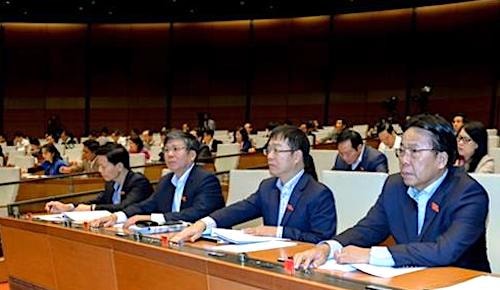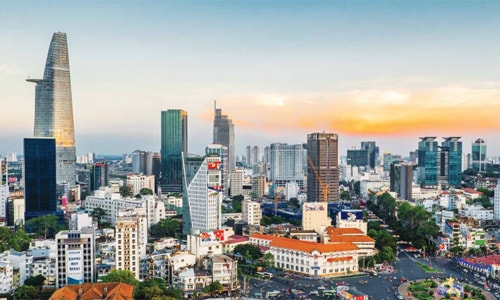National Assembly approves special mechanism for Ho Chi Minh City development
The National Assembly has not yet allowed Ho Chi Minh City to pilot a property tax, but has proposed that the Government study the Property Tax Law applicable nationwide.
On the afternoon of November 24, the National Assembly voted to pass a Resolution on four groups of specific mechanisms and policies for the development of Ho Chi Minh City, with 94.7% of delegates in favor.
According to Mr. Nguyen Duc Hai - Chairman of the Finance and Budget Committee, the pilot implementation of these mechanisms and policies is to "increase resources and create new development momentum for Ho Chi Minh City".
On land management,The Ho Chi Minh City People's Council is allowed to decide to change the purpose of using rice-growing land from 10 hectares or more, but it must be in accordance with the planning and plan for using rice-growing land approved by competent authorities.
Currently, the decision to change the purpose of using rice-growing land from 10 hectares or more is under the authority of the Prime Minister. With the above decentralization to the City People's Council, it will create conditions to reduce administrative procedures, helping Ho Chi Minh City to be proactive in using land to attract investment and develop the local economy and society.
About investment managementThe City People's Council is authorized to decide on investment policies for Group A projects using the city budget according to the provisions of the Law on Public Investment (currently under the authority of the Prime Minister), except for some types of special national monument projects, national defense and security...
Ho Chi Minh City is also piloting decentralization of decision-making on the form and method of selecting investors to implement public-private partnership (PPP) projects in cases where special and separate conditions arise that cannot apply the forms of selecting contractors and investors prescribed by the Law on Bidding.
 |
National Assembly delegates press the button to approve specific mechanisms and policies for Ho Chi Minh City. Photo: QH |
On state financial and budget management, City People's Council wasPropose to the Government for consideration and submit to the National Assembly Standing Committee for decision on pilot application of increased tax rates or tax levels for a number of goods subject to special consumption tax and environmental protection tax;Increase tax or tax rate by no more than 25% over current tax or tax rate.
Mr. Nguyen Duc Hai explained, regulationsThe ceiling for tax rate increase is 25%.to ensure price and market stability, without much impact on the lives of people and businesses.
The resolution increases the city's outstanding loan balance to no more than 90% of the city's budget revenue according to decentralization (currently 70%). Increasing the outstanding loan balance limit ensures that the city has more room to borrow, and is consistent with the policy of promoting the mechanism for localities to re-lend from foreign government loans, instead of current allocations.
With the above increase, according to the 2018 budget estimate, the city's maximum outstanding loan balance is about 70,000 billion VND, an increase of 15,700 billion VND, equivalent to about 0.3% of GDP compared to current regulations.
In addition, the City People's Council is allowed to decide to apply fees and charges not included in the list of fees and charges according to current regulations in the locality;Decision to adjust the level or rate of fees and charges compared to the level of the list of Law on fees and charges.
The city budget is entitled to 50% of the land use fee revenue when selling public assets attached to assets on land managed by central agencies in the area; this amount is used to invest in socio-economic infrastructure under the city's public investment tasks.
The city budget also enjoys revenue from equitization and divestment of state capital at state-owned enterprises managed by the City People's Committee; revenue from divestment of state capital at economic organizations of which the city is the representative owner.
The city uses this revenue and the city budget to invest in developing socio-economic infrastructure, including investment in flood prevention projects; the central budget does not supplement the city with VND 10,000 billion to implement these projects as planned in the medium-term public investment plan for the 2016-2020 period.
On the authorization mechanism and income of cadres, civil servants and public employees,The Chairman of the Ho Chi Minh City People's Committee is authorized to delegate authority to the Chairmen of the District People's Committees and heads of specialized agencies within the authority of the City Chairman.
The City People's Council has the right to decide on budget allocation to spend on increased average income for cadres, civil servants and public employees in the area.according to work performance; maximum level not exceeding 1.8 times the salary scale and position.
Income levels for experts, scientists and special talents of the city are regulated by the People's Council.
 |
Ho Chi Minh City will implement a new special mechanism from the beginning of next year. Photo: CH |
No property tax pilot yet
The resolution passed this time does not allow Ho Chi Minh City to pilot property tax.Explaining this content, Mr. Nguyen Duc Hai said that property tax is a direct tax that directly affects the majority of people, the real estate market, and the competitiveness and investment environment of Ho Chi Minh City.
“The pilot implementation of this tax in Ho Chi Minh City will create inequality between people, people who own houses and land in the city and people who own houses and land in other localities,” said Chairman Nguyen Duc Hai.
Therefore, the National Assembly Standing Committee proposed not to stipulate this content in the resolution. However, the National Assembly Standing Committee suggested that the Government should continue to study and submit to the National Assembly the Law on Property Tax to be applied uniformly nationwide in accordance with the orientation of reforming the national tax system in the 2016-2020 period.
According to VNE

